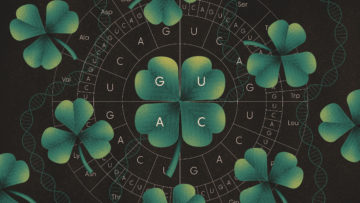Yasemin Saplakoglu in Quanta:
 As wildly diverse as life on Earth is — whether it’s a jaguar hunting down a deer in the Amazon, an orchid vine spiraling around a tree in Congo, primitive cells growing in boiling hot springs in Canada, or a stockbroker sipping coffee on Wall Street — at the genetic level, it all plays by the same rules. Four chemical letters, or nucleotide bases, spell out 64 three-letter “words” called codons, each of which stands for one of 20 amino acids. When amino acids are strung together in keeping with these encoded instructions, they form the proteins characteristic of each species. With only a few obscure exceptions, all genomes encode information identically.
As wildly diverse as life on Earth is — whether it’s a jaguar hunting down a deer in the Amazon, an orchid vine spiraling around a tree in Congo, primitive cells growing in boiling hot springs in Canada, or a stockbroker sipping coffee on Wall Street — at the genetic level, it all plays by the same rules. Four chemical letters, or nucleotide bases, spell out 64 three-letter “words” called codons, each of which stands for one of 20 amino acids. When amino acids are strung together in keeping with these encoded instructions, they form the proteins characteristic of each species. With only a few obscure exceptions, all genomes encode information identically.
Yet, in a new study published last month in eLife, a group of researchers at the Massachusetts Institute of Technology and Yale University showed that it’s possible to tweak one of these time-honored rules and create a more expansive, entirely new genetic code built around longer codon words.
More here.
